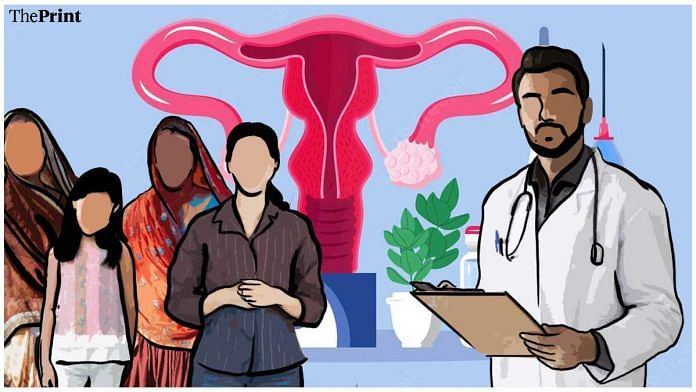Are doctors divided by gender? Do women avoid visiting male doctors, especially if they are gynaecologists? Do these male gynaecologists face difficulties at every step of their life and career—from acquiring expertise to securing a job and getting hitched? Ayushmann Khurrana starrer Doctor G tries to answer all these—and some more—pressing questions.
Anubhuti Kashyap’s Doctor G highlights the various problems faced by doctors, particularly male gynaecologists. From screaming women to conservative family members, patients and their relatives have strange reactions to male doctors in gyanecologists’ garb. ThePrint spoke to many such women’s doctors to get to the bottom of this issue.
Doctor G shows Ayushmann Khurrana in a confused state. Although many real-life male gynaecologists term such portrayals ignorant, some concur that there is truth to this.
Battling false accusations, conservative families
Male or female, Indian doctors are always accompanied by chaperones from the opposite sex to ensure comfort for patients. Sometimes, male doctors hire female nurses for this purpose. Dr Manan Gupta, gynaecologist and IVF expert at Atlantis Hospital told ThePrint that male doctors always need a female nurse by their side to ensure no woman can accuse them of molestation or inappropriate touch.
Gupta recalls the time he was slapped with a police case. “Once we were dealing with a case of an IVF procedure, which is also colloquially known as the ‘Test Tube Baby’ procedure. The entire treatment cycle costs up to Rs 3 lakh, and the guaranteed success rate in that procedure is only about 40 to 50 per cent,” he says.
But when the procedure was unsuccessful, the woman and her family falsely accused Gupta of molestation. “This is not a one-off incident. We have to face several such issues and people’s ire along with patients who make false accusations,” he adds.
Gupta mentions another incident in which a woman suffering from white vaginal discharge, or Leukorrhea, had come to him for treatment. Her husband was asked to sit outside during check-up. However, he was oblivious to the fact that a male gynaecologist was examining his wife. Gupta says that even though a female staff member was present during the checkup, as soon as the husband came to know about this, he started quarrelling with his wife. The couple left the hospital in a hurry, and never returned for a follow-up visit.
“However, when female patients are not able to explain their problems to male gynaecologists out of shame or if they refuse to consider them as ‘female specialists’, then we send them to female gynaecologists for further treatment,” says Gupta.
Families are often ‘disturbed’ when female members consult male specialists. “When a woman gets herself examined by a male gynaecologist, quite often her husband, parents or in-laws feel troubled. Even though the family knows that this male gynaecologist is a good one, they do not allow their daughter or wife to be examined by them,” rues Gupta.
There have been several instances where the presence of male gynaecologists has caused a ruckus. In 2016, the Additional Director of Medical and Health Services in Rajasthan issued an official order to all chief medical officers in the region. According to this government diktat, only female gynaecologists could conduct medical checkups on women patients. Once the controversy escalated, the state health department was forced to withdraw this order.
In another incident in 2020, when a male doctor from Uttar Pradesh’s Bareilly conducted normal delivery on his patient, Asha workers protested outside Shahjahanpur Medical College. They questioned why a male doctor was allowed to conduct delivery when female physicians were also present.
Another example is that of renowned gynaecologist and IVF specialist Dr Anoop Gupta, who has overseen the delivery of more than 18,000 children in his decades-long career. “All this ‘debate’ around male gynaecologists is limited to North India only. Places like Kolkata only have 1 per cent female gynaecologists. Yet, women choose male gynaecologists for consultation. Neither they nor their family members show any kind of hesitation in consulting male gynaecologists,” he adds.
He says that none of the patients he has treated have faced any problems thus far. Most importantly, they were all able to explain their problems openly.
Dr Anoop Gupta also claims that 80 per cent of female gynaecologists do not conduct surgeries. “Even if you go to a female gynaecologist, you will be referred to a male gynaecologist nearby who conducts surgery.”
Also read: Doctor G is not your average Ayushmann Khuranna film. He isn’t the hero with a message
Bizarre questioning irks patients
Female patients who choose to visit male gynaecologists are often bothered by strange questions. We spoke to one such patient. “The problem does not lie with the gynaecologist being male or female. The main issue is that after listening to their bizarre questions, we start feeling ashamed of ourselves and it also adversely affects our mental health,” says the patient, who is seeking treatment for irregular periods.
“They ask if you are married or not, and if not, then why? Do you have any sexual relations? If not, then how did you get this problem? And some doctors even warn us that if we do not reveal the truth, they will conduct an ultrasound to learn the truth.”
These questions are not limited to women from illiterate, rural and oppressed families. These bizarre interrogations would unnerve any woman, regardless of her background, social standing or education. The patient is forced to think if the doctor is pointing fingers at their character.
This woman has met as many as six gynaecologists in the last few months—two male and four female. While she was not bothered by every gynaecologist, she felt troubled by some of their questions.
This article is part of a series called Beyond the Reel. You can read all the articles here.
(Edited by Zoya Bhatti)



